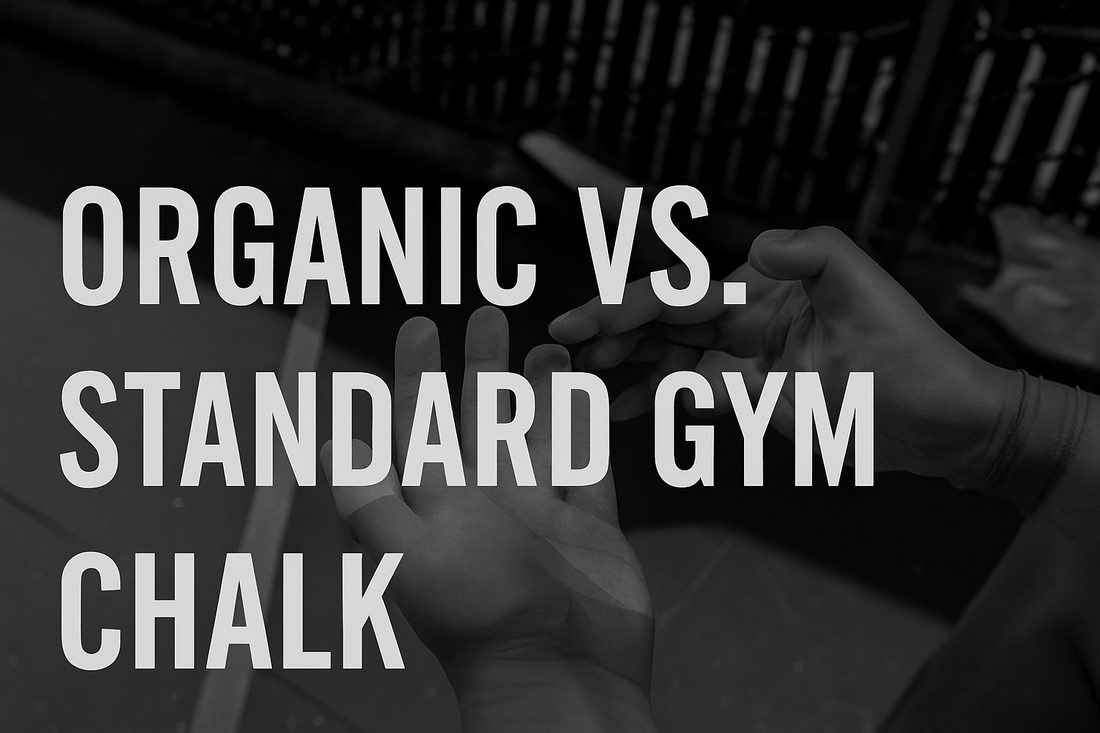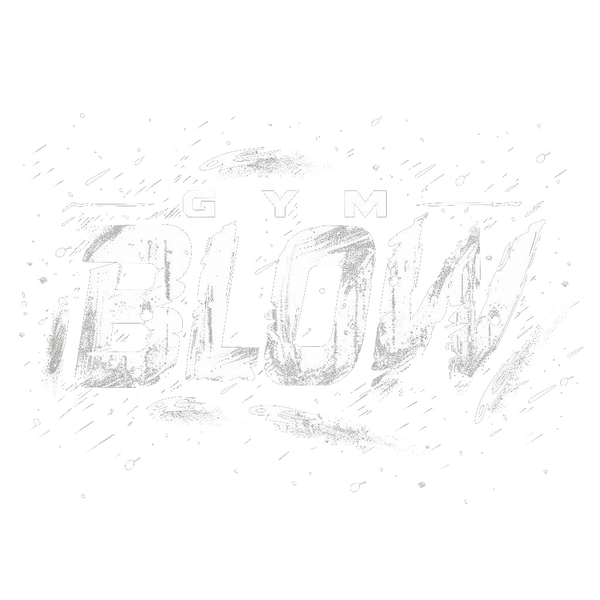
Organic vs Standard Gym Chalk
Share
What's Really In Your Grip Bag?
Your hands are sacred.
Your chalk should be too.
Let’s talk ingredients, integrity, and whether you’re clapping pure magnesium or mystery mix into your lungs.
JUMP LINKS:
- What Is Organic Gym Chalk?
- What Ingredients Are in Standard Gym Chalk?
- Organic vs. Standard Chalk: Performance and Grip Comparison
- Why Non-Toxic Chalk Matters for Skin and Lung Health
- Is Organic Chalk Worth It for Serious Lifters?
- Most Gym Chalk Isn’t Organic (And Why Gym Blow Is)
- Final Verdict: Which Chalk Type Should You Choose?
What Is Organic Gym Chalk?
It’s not kale. It’s not crystals blessed by a bearded man named Sage under a full moon. And no—it’s not made from recycled kombucha bottles.
Organic gym chalk is magnesium carbonate that's free from fillers, dyes, drying agents, and the weird chemical slurry that often sneaks into your standard lifting dust.
No additives. No “extra grip enhancers” (aka nonsense). Just pure, natural grip magic. The goal? Friction without the fiction.
What Ingredients Are in Standard Gym Chalk?
Glad you asked. Because that “standard” block of chalk in the bottom of your gym bag? It might be hiding more than just your lost gains.
- Magnesium Carbonate – cool, normal, expected.
- Talc – banned in climbing gyms for a reason. Suspicious.
- Calcium Carbonate – chalk filler. Flakes faster than a flaky Tinder date.
- Binders and Drying Agents – cheap industrial stuff to keep the block solid.
- Fragrance or dyes – do your palms really need to smell like cucumber melon?
Bottom line: standard gym chalk is often designed to be mass-produced and “good enough.” But when it comes to performance? It’s like taping your fingers with wet spaghetti.
Organic vs. Standard Chalk: Performance and Grip Comparison
| Feature | Organic Chalk | Standard Chalk |
|---|---|---|
| Grip | Grippy as hell. No clump, no slip. | Inconsistent. Sometimes clutch, sometimes crust. |
| Skin Feel | Smooth, breathable, non-irritating | Can feel gritty or greasy |
| Sweat Absorption | Superior (think matte finish for your palms) | Often cakes under pressure |
| Air Quality | Cleaner – less dust cloud apocalypse | You’ll taste it before you feel it |
| Application | Even, consistent, satisfying | Crumbly mess that haunts gym floors |
If performance matters, organic chalk is your ticket to palm paradise.
Why Non-Toxic Chalk Matters for Skin and Lung Health
Let’s talk respiratory realness. If you’ve ever clapped chalk and inhaled a puff like pre-workout incense, congrats—you’ve experienced the lung slap of subpar chalk.
Cheap chalk contains micro-particulates, skin-drying agents, and chemical fillers. Organic chalk avoids all that.
This matters more than you think—especially if you train indoors, lift often, or have sensitive skin.
Is Organic Chalk Worth It for Serious Lifters?
If you’re asking this, you’re probably serious about performance. Here’s the deal:
- Organic chalk lasts longer per application.
- Clings harder under pressure.
- Doesn’t wreck your skin barrier.
Lifting with garbage chalk is like training legs in Crocs. You can do it. But why would you?
Most Gym Chalk Isn’t Organic (And Why Gym Blow Is)
Let’s be blunt: most gym chalk out there isn’t organic.
It’s a cocktail of convenience, cost-cutting, and chemical shortcuts. If it doesn’t say it’s clean, assume it’s not.
Some chalks may contain fillers, drying agents, or binders—especially in liquid or block form. Watch out for:
- Alcohols (like isopropyl or ethanol)
- Rosin or resin (used in some liquid chalks)
- Fragrances or synthetic additives
- Colorants or dyes
- Silicates or calcium carbonate (cheaper alternatives)
Examples of Non-Organic Chalk Brands or Types:
-
Generic Bulk Gym Chalk (sold in blocks or powdered bags)
Often manufactured overseas with minimal ingredient transparency and may contain synthetic additives or fillers. -
Liquid Chalks from Big-Box Brands
Many use denatured alcohol and synthetic stabilizers. Examples: Harbinger Liquid Chalk, Black Diamond Liquid White Gold -
Colored Chalks
Any chalk with pigment is likely to include synthetic dyes.
How to Spot (or Avoid) Non-Organic Chalk:
- No ingredient label = assume synthetic
- No mention of “pure” magnesium carbonate
- Very low price = often mass-produced with fillers
- Marketed without any health/sustainability focus
If you want organic or pure chalk, look for:
- 100% pure magnesium carbonate
- No added dyes, alcohols, or chemicals
- Labeled as “food-grade” or “climbing-grade” chalk
- Transparent supply chain
Organic Brands that deliver:
- Gym Blow – 100% made in the USA, zero imported ingredients, and no artificial nonsense. It’s grip with integrity.
- FrictionLabs (premium climbing chalk)
- Gorilla Grip (some options are additive-free)
Still not sure? Hit us up. We’ll help you find the cleanest chalk you can clap.
Which Chalk Type Should You Choose?
Choose organic chalk if:
- You value grip performance over gimmicks
- You don’t want to breathe in drywall dust every lift
- You want consistency and longevity
Choose standard chalk if:
- You like chaos
- You enjoy underperforming
- You think filler is flavor
Grip Report’s Take: Upgrade your grip. Treat your hands like they matter.

